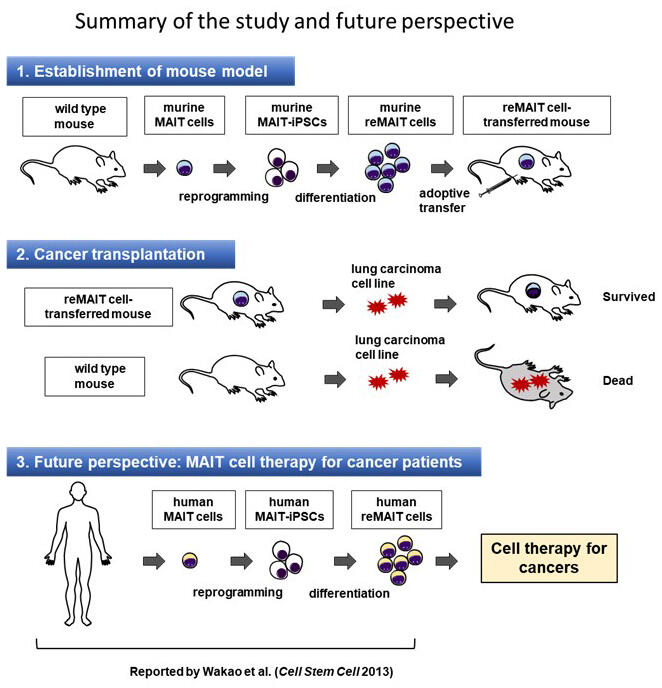A research group comprised of Associate Professor Chie Sugimoto and Professor Hiroshi Wakao of the Host Defense Division, Research Center for Advanced Medical Science, Dokkyo Medical University, have found that MAIT (Mucosal-associated invariant T) cells derived from induced pluripotent stem cells (iPSC) are able to kill a wide variety of cancer cells and that when they are introduced into mice that are subsequently inoculated with tumors, cancer metastasis was inhibited and their prognosis was improved.

Courtesy of Associate Professor Sugimoto, Dokkyo University
MAIT cells, as their name implies, are commonly found in mucosal tissue such as the lamina propria of the intestinal mucous membrane and lungs, as well as in peripheral blood and the liver. According to Professor Wakao, "MAIT cells are reported to be involved in infectious diseases, autoimmune diseases, asthma, lifestyle-related diseases, and cancer, but their function in relation to cancer had not yet been clarified."
To address this, the research group used MAIT cells from mice to create iPS cells (MAIT-iPS cells), and then differentiated them into MAIT-like cells (m-reMAIT cells). These were introduced into wild mice to clarify their characteristics, especially in relation to their anti-cancer activity.
By doing so, the group established a method by which they could mass produce MAIT cells with over 94% purity by starting with a tiny quantity of MAIT cells, reprogramming them into iPS cells, and differentiating them. Additionally, when the reMAIT cells were activated through antigen stimulus, they learned that these reMAIT cells have the same ability to be activated by antigens as normal MAIT cells that exist within the body. Furthermore, with regard to metastasis inhibition, they found that the survival of mice that had reMAIT cells introduced beforehand was prolonged in a meaningful way. This effect was also enhanced by increasing the number of reMAIT cells introduced.
Regarding cytolytic activity against cancer cells, reMAIT cells were found to kill Lewis lung carcinoma cells as well as the lymphoma Yac-1 cells. This cytolytic activity was further enhanced when natural killer (NK) cells were also present.
Accordingly, it was found that reMAIT cells exhibited NK dependent anticancer activity in the mouse model of cancer metastasis. This significant finding demonstrated that while the types of cancer that could be targeted by immunotherapy using cytotoxic T cells were limited, reMAIT cells are capable of destroying multiple types of cancer cells.
According to Professor Wakao, "Now that we have verified the inhibition of cancer metastasis in mice, we next intend to clarify whether MAIT cells derived from human iPS cells also function in the same way."
This article has been translated by JST with permission from The Science News Ltd.(https://sci-news.co.jp/). Unauthorized reproduction of the article and photographs is prohibited.




